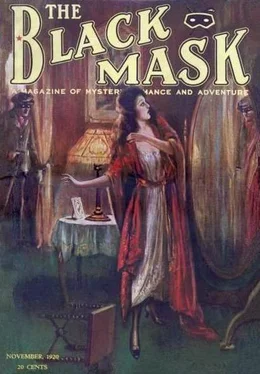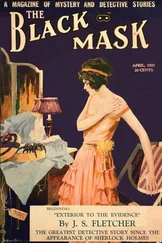Hamilton Craigie - The Black Mask Magazine (Vol. 2, No. 2 — November 1920)
Здесь есть возможность читать онлайн «Hamilton Craigie - The Black Mask Magazine (Vol. 2, No. 2 — November 1920)» весь текст электронной книги совершенно бесплатно (целиком полную версию без сокращений). В некоторых случаях можно слушать аудио, скачать через торрент в формате fb2 и присутствует краткое содержание. Город: New York, Год выпуска: 1920, Издательство: Pro-distributors Publishing Company, Жанр: Классический детектив, на английском языке. Описание произведения, (предисловие) а так же отзывы посетителей доступны на портале библиотеки ЛибКат.
- Название:The Black Mask Magazine (Vol. 2, No. 2 — November 1920)
- Автор:
- Издательство:Pro-distributors Publishing Company
- Жанр:
- Год:1920
- Город:New York
- ISBN:нет данных
- Рейтинг книги:5 / 5. Голосов: 1
-
Избранное:Добавить в избранное
- Отзывы:
-
Ваша оценка:
- 100
- 1
- 2
- 3
- 4
- 5
The Black Mask Magazine (Vol. 2, No. 2 — November 1920): краткое содержание, описание и аннотация
Предлагаем к чтению аннотацию, описание, краткое содержание или предисловие (зависит от того, что написал сам автор книги «The Black Mask Magazine (Vol. 2, No. 2 — November 1920)»). Если вы не нашли необходимую информацию о книге — напишите в комментариях, мы постараемся отыскать её.
The Black Mask Magazine (Vol. 2, No. 2 — November 1920) — читать онлайн бесплатно полную книгу (весь текст) целиком
Ниже представлен текст книги, разбитый по страницам. Система сохранения места последней прочитанной страницы, позволяет с удобством читать онлайн бесплатно книгу «The Black Mask Magazine (Vol. 2, No. 2 — November 1920)», без необходимости каждый раз заново искать на чём Вы остановились. Поставьте закладку, и сможете в любой момент перейти на страницу, на которой закончили чтение.
Интервал:
Закладка:
II
When I regained consciousness my first feeling was of pain, white-hot, searing pain that darted across my face like little streaks of fire. I moved and my whole body responded with a great swell of torture. I could not help but cry out from it, and I heard a quick stir at the other side of the room where I lay in a bunk.
I turned my eyes, and saw a cabin typical of the trapper’s shacks scattered throughout the north country, with a rifle over the fireplace where pine sticks blazed, and great bunches of furs hanging on the walls; rich, glossy pelts of marten and fox. Then the girl bent over me.
M’sieu, she was beautiful. She was young, not more than twenty, I thought, and her skin was white like new milk shaded as by rich cream from wind and sun. Her lips I should have sworn were painted had not the cut of her belted, dress and the way her black hair was piled loose on her head told me here was a girl who knew little of civilization. She was a wild thing of the woods, sweet and beautiful like the flowers. The hand she laid on my head was soft and cool, and, m’sieu, I swear it, under that touch the pain left as snow melts before the breath of the Chinook in the spring.
“Where am I?” I asked.
“You are safe,” she half whispered the words, and threw a nervous glance over her shoulder toward the door.
Then she smiled, but still I saw fear in her eyes.
She brought me hot broth then, and scalding tea, that loosened a little the grip of the frost devils in my body and set the blood flowing more freely. But still I could not get up, for my legs were swollen and aching with the rheumatism in them. The cold of the north does not easily let go its grip.
That day I lay and watched the girl move about the cabin working, cooking over the small stove in one corner, sewing, or turning drying pelts that hung on the walls. But always she seemed listening, and at each sound at the door she started nervously.
Often she would press her face to the window glass, striving to pierce the terrible murky whiteness outside. For the storm still tore on in its mad dance, and made the day almost dark as night so that the lamp had to be kept burning. And as I lay there watching the girl, who every now and then threw a half-fearful glance at me, or staring at the smoked rafters of the roof, I had a feeling that here in this cabin I had stumbled on some mystery of the north—which hides so much that is terrible and tragic.
The wind screeched mournfully over the chimney and I got to fancying that at times it laughed, yes, m’sieu, actually laughed, like some fiend that watches and waits for the enacting of tragedy to satisfy its bloodthirsty humor. And I wondered what it was out in that white storm that the girl feared.
The day wore on, and again the great darkness stole over the north country and blotted out the dim light that filtered through the falling snow. And with the night the girl’s nervousness and fears seemed to increase. The frost in my body was so loosened now that I could turn and watch her better. Several times I tried to draw her into conversation, then, after awhile, she came and sat by my bed.
“M’sieu,” she said, watching me with her great dark eyes, “how—how did you come here?”
There was that same fear in her voice, and something else I did not know, whether hope or merely wonder.
Then I told her how I had got caught in the storm and became lost, stumbling upon the cabin by accident.
“Ah,” she sighed, when I had finished. “You are the first, m’sieu, to find it. Yes,” she went on at my look of wonder, “there is but one person in the world besides myself who knows this cabin is here. Even I do not know the way out of this hidden country—Lost Creek, I call it.”
The door rattled then and her face went suddenly white as the floating flakes outside and she threw a quick look of fear over her shoulder.
She turned to me again with a little shiver of relief.
“It was only the wind,” she faltered, smiling feebly.
I raised myself on my elbow then, and seized her hand that lay on my bunk, like the hand of a child that seeks company in the dark.
“Listen, mam’selle! ” I cried, “tell me what is it you fear?”
“Oh, no, no, please, m’sieu, I cannot!”
She drew away with fear alive in her eyes.
But I was persistent, and, woman-like, in her heart she did want to confide in someone, and then—she told me.
She was an orphan, left when she was very small in the care of an uncle, who had always been what people call queer. She told how she had known him to sit for a whole day at a time, silent and moody, taking no note of what went on about him. In the winters he trapped, but he made no friends and, in fact, so much as was possible, avoided contact with other people.
She loved him, for he was her only relative, and cared for him tenderly. And though there were other people who were inclined to be frightened of him, he was like a child in her hands. A great affection for her grew in his heart as the years went on, and he came to be restless and uneasy-whenever she was out of his sight, as though he was afraid He should lose her.
They lived, the two of them, far up in the Height-of-Land country a many days' journey from any post. But I have said she was beautiful. M’sieu, do you know there is about a beautiful woman something that draws men, even from great distances, like gold? Ah, m’sieu, nature can not long hide her two greatest treasures.
So it was that a lover came. He was a trapper, who stopped at the cabin one spring as he was on his way south with his winter’s catch of furs, and there he saw the girl—her name? Ah, m’sieu, that I never knew. After all, names matter so little in this world. Those two loved each other from the first, and therefore that summer the young trapper came often to the cabin.
The uncle saw all this, and there awoke in his mind that latent fear that the only thing that had ever awakened a bit of affection in his heart was to be taken away from him. He threatened the trapper, but the young men of the north are brave. The lover laughed at him. Then the devil that had been brooding in the uncle these years awoke and stirred to life. The man became a maniac, with but one idea in his distorted mind, that to keep the girl from being taken away from him.
In his young days the uncle had once trapped in a country far to the north, where few men ever go, and in that sad and lonely country there was known to him a hidden creek where one might live for long years and never see so much as a wandering Indian. And it was that one night the girl was awakened from her sleep to find the mad uncle commanding her to rise and come with him.
He had a canoe packed with their belongings, ready in the river near their cabin. She looked but once into his eyes and saw there the devil light that told her it was useless to resist. She knew he loved her, in his savage, selfish way, and would not harm a hair of her head so long as she obeyed him. But if she did not, she knew he was mad.
When morning came they were far up the river, and there were none behind who knew whence they had gone. The girl had tried to leave some message in hope that her lover would find it and follow, but the madman suspected she would try such a ruse, and watched, making it useless.
For three days they paddled up the river, and the fourth day the uncle transferred all the duffle to the bank and sunk the canoe.
Then for three more days they traveled far up into the north, twisting and turning in strange regions where the girl lost all sense of direction and knew she should never find her way out.
The fourth day they came to the little cabin on the hidden creek where the uncle had trapped one winter and where no man had been since. He repaired the house and there they lived, the girl desperately hoping that some day her lover, who she knew was scouring the northland searching for her, would find the place.
Читать дальшеИнтервал:
Закладка:
Похожие книги на «The Black Mask Magazine (Vol. 2, No. 2 — November 1920)»
Представляем Вашему вниманию похожие книги на «The Black Mask Magazine (Vol. 2, No. 2 — November 1920)» списком для выбора. Мы отобрали схожую по названию и смыслу литературу в надежде предоставить читателям больше вариантов отыскать новые, интересные, ещё непрочитанные произведения.
Обсуждение, отзывы о книге «The Black Mask Magazine (Vol. 2, No. 2 — November 1920)» и просто собственные мнения читателей. Оставьте ваши комментарии, напишите, что Вы думаете о произведении, его смысле или главных героях. Укажите что конкретно понравилось, а что нет, и почему Вы так считаете.












